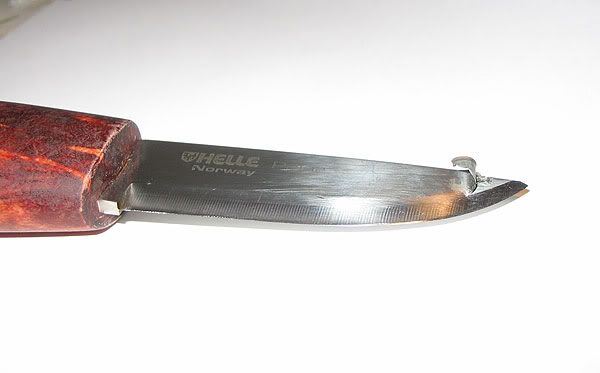I think it's the choice factor.
If I have both resources, time and availability of choice, would I choose to use a 'hunting' knife as a bushcraft knife ?
The answer is no.
There's a reason that the woodlore style is so very popular, and it's not all down to imitation or adulation.
It's robust, easily trued up, fits so that it can be used all day without damaging the hands, will work in wet and muddy as well as in dry and hot.
It will do a very good job on fine carving and work, as well as it will take battoning or use to create woodworking features where one would normally use a chisel. It does not scream 'tacticool' or 'nutter survivalist'.
It's almost the 'one ring to rule them all' kind of knife.
It does have issues though; it's heavier than others of similar size, it will need sharpening, it does need dried and oiled/waxed, it is uncompromisingly a 'knife' and that's not always a comfortable thing to carry in our very urban society.
Generally relatively expensive too, unlike the majority of the 'hunting' knives.....probably why we cheerfully recommend moras to newbies.
In a survival situation the knife you have is the one you have to use.
Back to the old adage though, about survival being get the hell out asap and bushcraft being chill the hell out asap
Bushcraft is a huge range of skills though, and 'survival' and hunting are only a subset of them.
cheers,
Toddy
If I have both resources, time and availability of choice, would I choose to use a 'hunting' knife as a bushcraft knife ?
The answer is no.
There's a reason that the woodlore style is so very popular, and it's not all down to imitation or adulation.
It's robust, easily trued up, fits so that it can be used all day without damaging the hands, will work in wet and muddy as well as in dry and hot.
It will do a very good job on fine carving and work, as well as it will take battoning or use to create woodworking features where one would normally use a chisel. It does not scream 'tacticool' or 'nutter survivalist'.
It's almost the 'one ring to rule them all' kind of knife.
It does have issues though; it's heavier than others of similar size, it will need sharpening, it does need dried and oiled/waxed, it is uncompromisingly a 'knife' and that's not always a comfortable thing to carry in our very urban society.
Generally relatively expensive too, unlike the majority of the 'hunting' knives.....probably why we cheerfully recommend moras to newbies.
In a survival situation the knife you have is the one you have to use.
Back to the old adage though, about survival being get the hell out asap and bushcraft being chill the hell out asap
Bushcraft is a huge range of skills though, and 'survival' and hunting are only a subset of them.
cheers,
Toddy

 Tacticool, I'm pinching that.
Tacticool, I'm pinching that.
 I use sabatiers for that. That said, I'm still using KD's that are well over 25 years old and they're still sound
I use sabatiers for that. That said, I'm still using KD's that are well over 25 years old and they're still sound 
